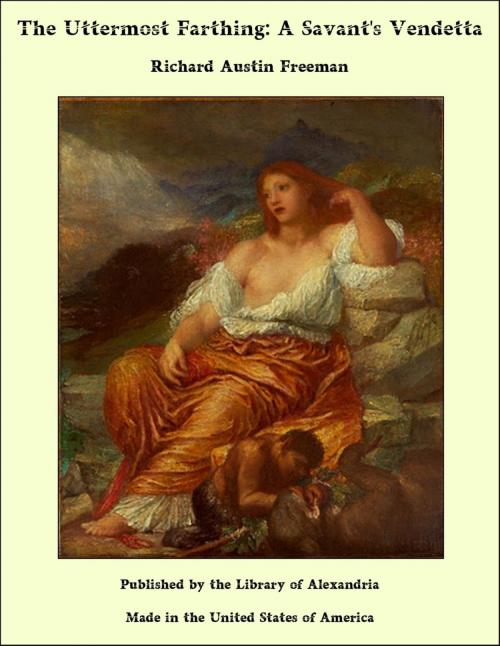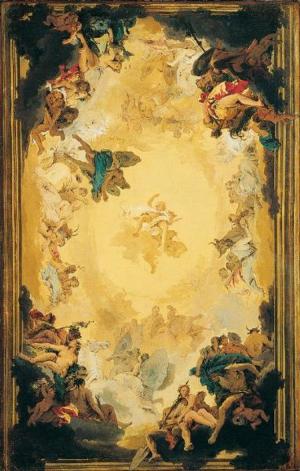The Uttermost Farthing: A Savant's Vendetta
Nonfiction, Religion & Spirituality, New Age, History, Fiction & Literature| Author: | Richard Austin Freeman | ISBN: | 9781465627490 |
| Publisher: | Library of Alexandria | Publication: | March 8, 2015 |
| Imprint: | Language: | English |
| Author: | Richard Austin Freeman |
| ISBN: | 9781465627490 |
| Publisher: | Library of Alexandria |
| Publication: | March 8, 2015 |
| Imprint: | |
| Language: | English |
It is not without some misgivings that I at length make public the strange history communicated to me by my lamented friend Humphrey Challoner. The outlook of the narrator is so evidently abnormal, his ethical standards are so remote from those ordinarily current, that the chronicle of his life and actions may not only fail to secure the sympathy of the reader but may even excite a certain amount of moral repulsion. But by those who knew him, his generosity to the poor, and especially to those who struggled against undeserved misfortune, will be an ample set-off to his severity and even ferocity towards the enemies of society. Humphrey Challoner was a great savant spoiled by untimely wealth. When I knew him he had lapsed into a mere dilettante; at least, so I thought at the time, though subsequent revelations showed him in a rather different light. He had some reputation as a criminal anthropologist and had formerly been well known as a comparative anatomist, but when I made his acquaintance he seemed to be occupied chiefly in making endless additions to the specimens in his private museum. This collection I could never quite understand. It consisted chiefly of human and other mammalian skeletons, all of which presented certain small deviations from the normal; but its object I could never make out—until after his death; and then, indeed, the revelation was a truly astounding one. I first made Challoner's acquaintance in my professional capacity. He consulted me about some trifling ailment and we took rather a liking to each other. He was a learned man and his learning overlapped my own specialty, so that we had a good deal in common. And his personality interested me deeply. He gave me the impression of a man naturally buoyant, genial, witty, whose life had been blighted by some great sorrow. Ordinarily sad and grave in manner, he exhibited flashes of a grim, fantastic humor that came as a delightful surprise and showed what he had been, and might still have been, but for that tragedy at which he sometimes hinted. Gentle, sympathetic, generous, his universal kindliness had yet one curious exception: his attitude towards habitual offenders against the law was one of almost ferocious vindictiveness. At the time that I went away for my autumn holiday his health was not quite satisfactory. He made no complaint, indeed he expressed himself as feeling perfectly well; but a certain, indefinable change in his appearance had made me a little uneasy. I said nothing to him on the subject, merely asking him to keep me informed as to his condition during my absence, but it was not without anxiety that I took leave of him. The habits of London society enable a consultant to take a fairly liberal holiday. I was absent about six weeks, and when I returned and called on Challoner, his appearance shocked me. There was no doubt now as to the gravity of his condition. His head appeared almost to have doubled in size. His face was bloated, his features were thickened, his eyelids puffy and his eyes protruding. He stood, breathing hard from the exertion of crossing the room and held out an obviously swollen hand.
It is not without some misgivings that I at length make public the strange history communicated to me by my lamented friend Humphrey Challoner. The outlook of the narrator is so evidently abnormal, his ethical standards are so remote from those ordinarily current, that the chronicle of his life and actions may not only fail to secure the sympathy of the reader but may even excite a certain amount of moral repulsion. But by those who knew him, his generosity to the poor, and especially to those who struggled against undeserved misfortune, will be an ample set-off to his severity and even ferocity towards the enemies of society. Humphrey Challoner was a great savant spoiled by untimely wealth. When I knew him he had lapsed into a mere dilettante; at least, so I thought at the time, though subsequent revelations showed him in a rather different light. He had some reputation as a criminal anthropologist and had formerly been well known as a comparative anatomist, but when I made his acquaintance he seemed to be occupied chiefly in making endless additions to the specimens in his private museum. This collection I could never quite understand. It consisted chiefly of human and other mammalian skeletons, all of which presented certain small deviations from the normal; but its object I could never make out—until after his death; and then, indeed, the revelation was a truly astounding one. I first made Challoner's acquaintance in my professional capacity. He consulted me about some trifling ailment and we took rather a liking to each other. He was a learned man and his learning overlapped my own specialty, so that we had a good deal in common. And his personality interested me deeply. He gave me the impression of a man naturally buoyant, genial, witty, whose life had been blighted by some great sorrow. Ordinarily sad and grave in manner, he exhibited flashes of a grim, fantastic humor that came as a delightful surprise and showed what he had been, and might still have been, but for that tragedy at which he sometimes hinted. Gentle, sympathetic, generous, his universal kindliness had yet one curious exception: his attitude towards habitual offenders against the law was one of almost ferocious vindictiveness. At the time that I went away for my autumn holiday his health was not quite satisfactory. He made no complaint, indeed he expressed himself as feeling perfectly well; but a certain, indefinable change in his appearance had made me a little uneasy. I said nothing to him on the subject, merely asking him to keep me informed as to his condition during my absence, but it was not without anxiety that I took leave of him. The habits of London society enable a consultant to take a fairly liberal holiday. I was absent about six weeks, and when I returned and called on Challoner, his appearance shocked me. There was no doubt now as to the gravity of his condition. His head appeared almost to have doubled in size. His face was bloated, his features were thickened, his eyelids puffy and his eyes protruding. He stood, breathing hard from the exertion of crossing the room and held out an obviously swollen hand.















